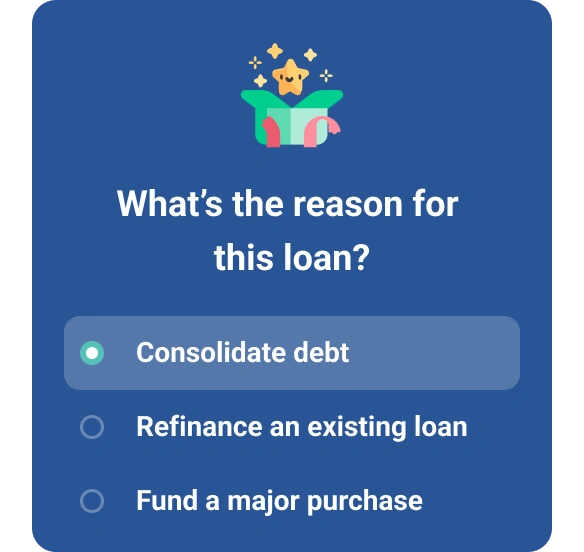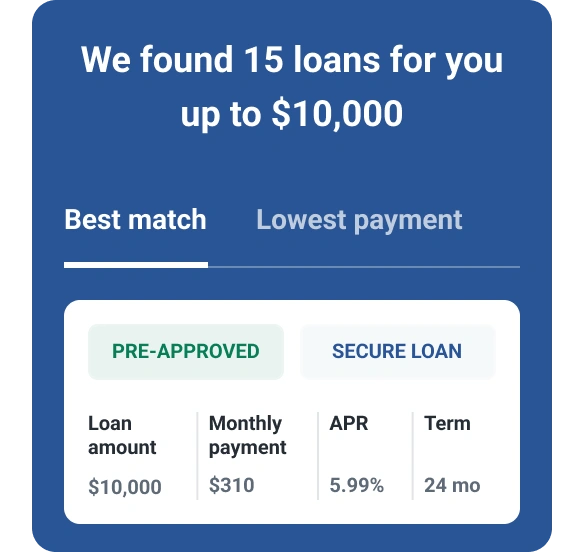Personal Loan Calculator
Before taking out a personal loan, you'll want to compare your options and figure out which loan will be best for you. This personal loan calculator can help you estimate your monthly payments based on a few pieces of information. You can then change the loan amount, interest rate or repayment term to see how a different loan might be better or worse for your situation.
How to Use This Calculator
The personal loan calculator estimates your monthly payment and provides a payment schedule based on a few potential loan terms. Here's how to use it:
- Enter your desired loan amount. Depending on the lender, you may be able to borrow anywhere from $250 to $100,000. Note that some lenders deduct an origination fee before disbursing your funds, so you may need to borrow slightly more than you actually need.
- Estimate your interest rate. Personal loan interest rates typically range from 7% to 36%, with your assigned rate based on your creditworthiness. Borrowers with higher credit scores tend to qualify for the best terms.
- Provide your desired repayment term. Personal loan repayment terms often range from one to seven years, though some lenders may offer less flexibility.
- Calculate your payment. Click on the "Calculate" button to get an estimate of your monthly payment, how much interest you'll pay over the life of the loan and a detailed repayment schedule.
Compare personal loan rates
Find APRs from 4.99% to 35.99% and flexible terms of 12 to 120 months. Loan amounts range from $1,000 up to $250,000, with funding available the same day or up to 7 days.
Offers from our partners
View all of our Best Personal Loans for 2026 to see what you’re likely to qualify for, and the rates and terms you might get.
How to Compare Personal Loans
Before choosing a personal loan, it's important to look beyond the monthly payment and consider the full cost of borrowing. Experian's personal loan calculator can make it easier for you to compare multiple offers and make a more informed decision.
Here are some tips to help you compare personal loan offers:
- Look at the total cost. A lower monthly payment might seem attractive, but it may mean you're paying more interest over time. The total interest cost gives you the full picture of how much you'll pay in the long run.
- Focus on the annual percentage rate (APR). The APR includes the interest rate and most fees, giving you a more accurate view of the loan's true cost.
- Consider loan term length. Longer terms lower your monthly payments but increase the total interest cost. On the flip side, a shorter loan term can help minimize your interest costs, but it'll result in a higher monthly payment. Carefully consider your options to determine the right term length for your situation.
- Watch out for fees. Some lenders charge origination fees that can affect the total loan cost. These fees directly affect how much of the loan amount you actually receive.
As you evaluate offers, ask yourself whether the monthly payment or total cost is more important to you. If your priority is keeping your budget flexible, a lower monthly payment might make sense. But if you can afford a higher payment, choosing the loan with the lowest total cost can save you hundreds—or even thousands—of dollars over time.
Here's an example of two hypothetical scenarios for someone looking to borrow $10,000:
| Terms | Loan A | Loan B |
|---|---|---|
| Loan amount | $10,000 | $10,000 |
| Interest rate | 10% | 13% |
| Repayment term | 3 years | 5 years |
| Monthly payment | $322.67 | $227.53 |
| Total interest paid | $1,616.19 | $3,651.84 |
How to Apply for a Personal Loan
Applying for a personal loan is often fast and straightforward, especially with lenders that let you complete the process online. Here are some steps you can take to apply:
- Start with prequalification. Many lenders offer a prequalification process that uses a soft credit check, which won't affect your credit score. You'll typically need to share basic personal details, along with the loan amount and how you plan to use it.
- Review your loan offers. If you're prequalified, you'll receive estimated offers with potential interest rates, terms and monthly payments. You can compare these offers and choose the one that fits your needs.
- Submit a full application. Once you select an offer, you'll complete a formal loan application with your chosen lender. This process typically results in a hard inquiry on your credit reports, which can affect your credit score.
- Provide supporting documentation. In some cases, lenders may request additional documents to verify your identity and income. Be sure to provide accurate and up-to-date information to avoid delays or denial.
- Wait for final approval. Even if you were prequalified, final approval isn't guaranteed. Depending on the situation, you may receive a decision instantly, or you may need to first provide supporting documentation.
- Review the loan offer. If you're approved, take some time to review the terms and conditions of the agreement before accepting it, as they may or may not be the same as the initial quote. If you agree to the terms, sign the contract and provide banking details so the lender can disburse the funds.
Frequently Asked Questions
Check Your Personal Loan Matches
With Experian, you can compare personal loans based on your credit profile, making it easier to get personalized loan offers from our partners. You can sort by the estimated APR, repayment terms or loan amounts to narrow in on a few of the best-fitting options.
With a free Experian account, you can also readily check your FICO® ScoreΘ and Experian credit report. These resources can help you determine where you stand and provide insights into how you can improve your credit score and qualify for better loan terms.
What makes a good credit score?
Learn what it takes to achieve a good credit score. Review your FICO® Score for free and see what’s helping and hurting your score.
Get your FICO® ScoreNo credit card required
Explore more topics
- Auto lease calculator
- Reverse car loan calculator
- Car payment calculator
- APR calculator
- Savings calculator
- Mortgage calculator
- Mortgage affordability calculator
- Balloon mortgage calculator
- Biweekly mortgage calculator
- Extra payments mortgage calculator
- Interest only mortgage calculator
- Mortgage insurance calculator
- Mortgage payoff calculator
- Mortgage prequalification calculator
- Mortgage points calculator
- Credit card payoff calculator


